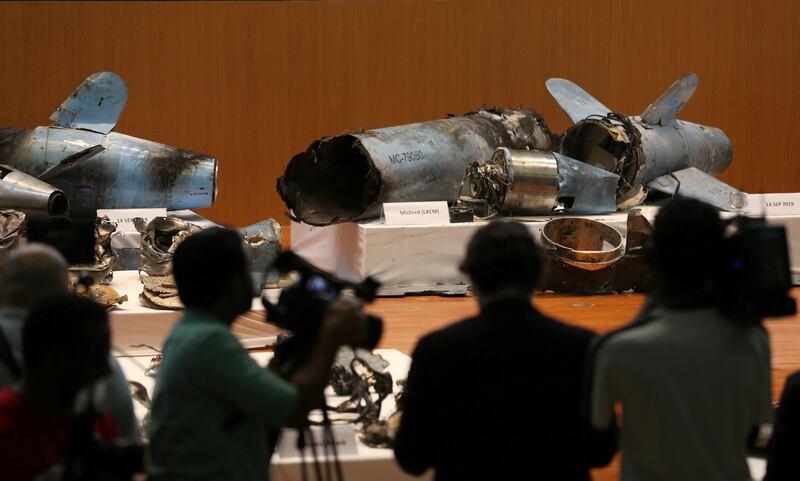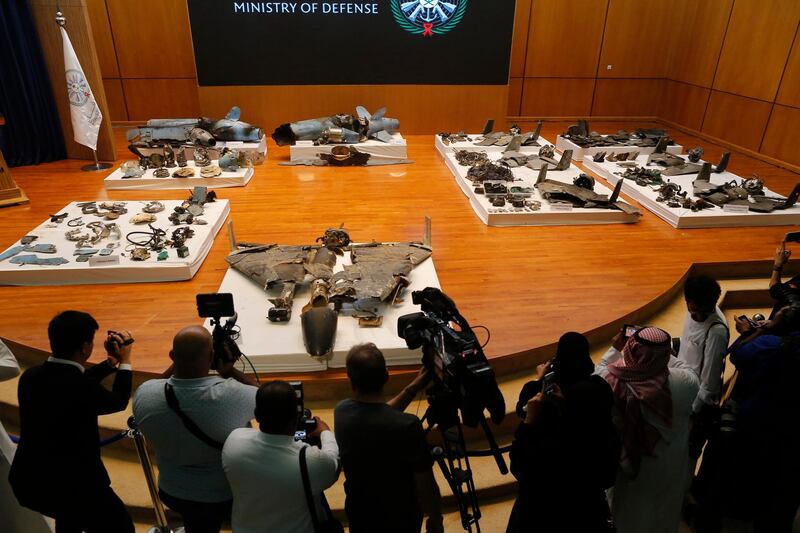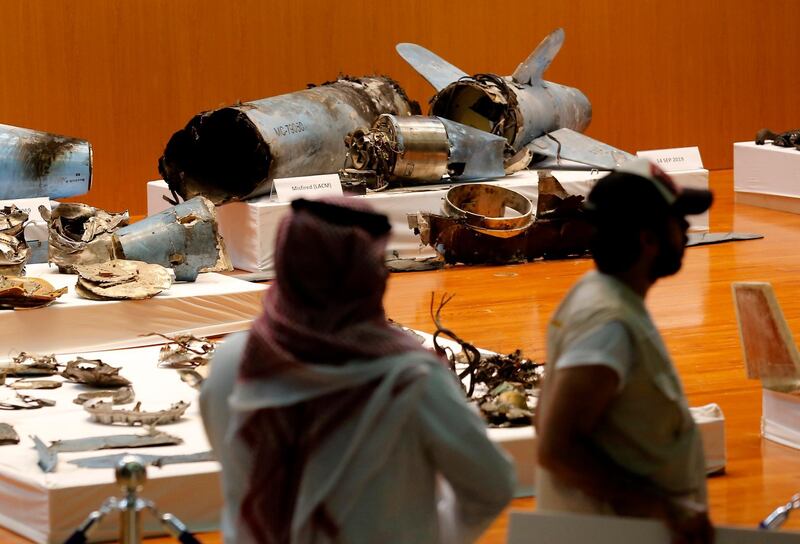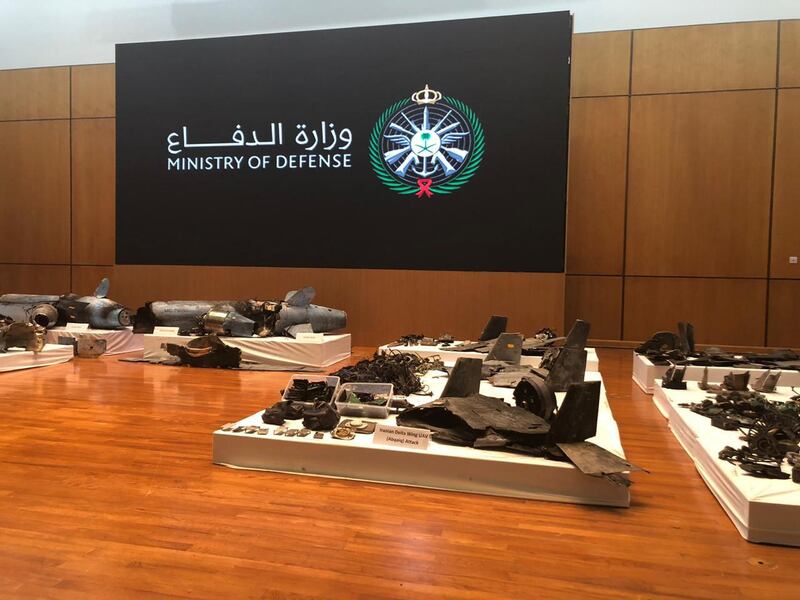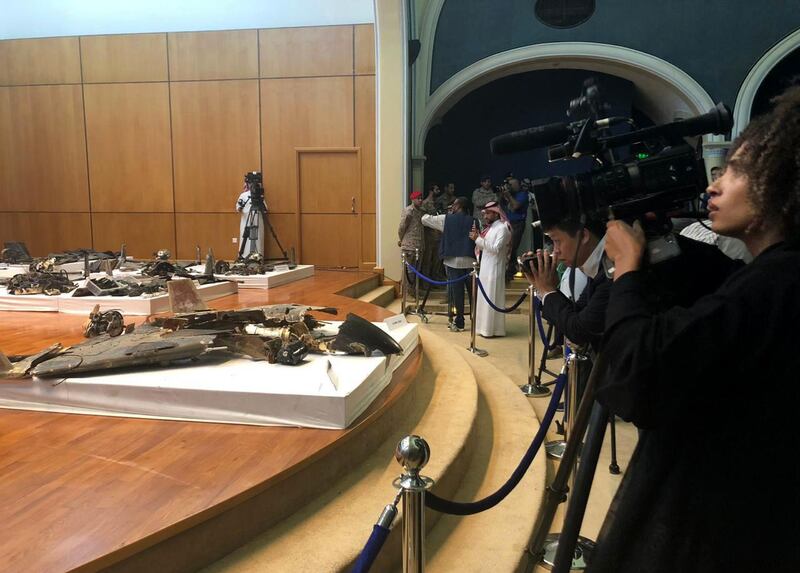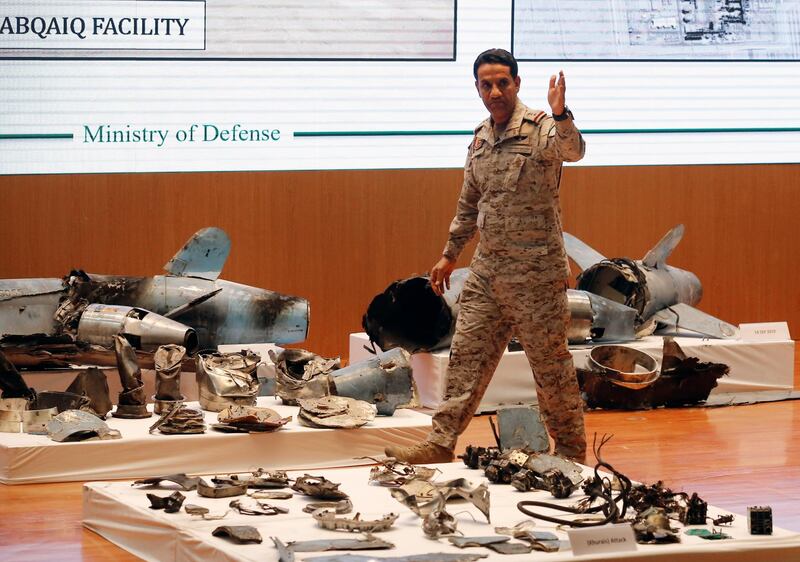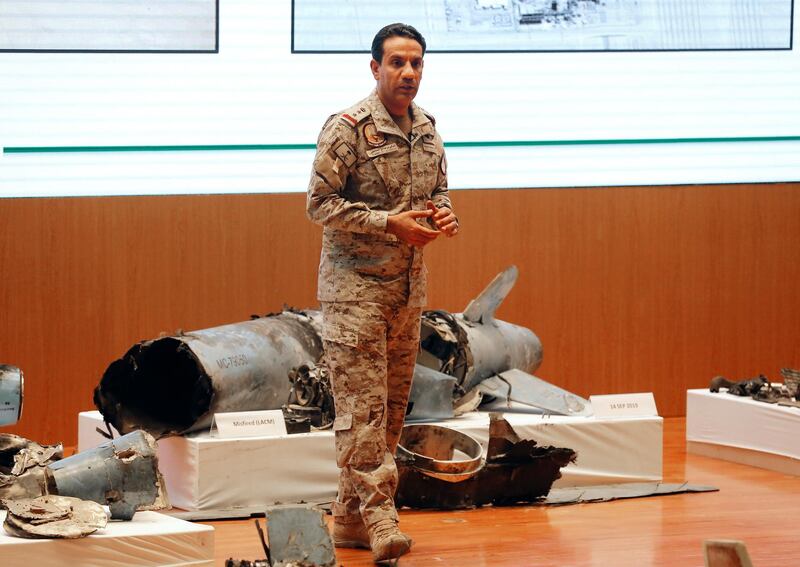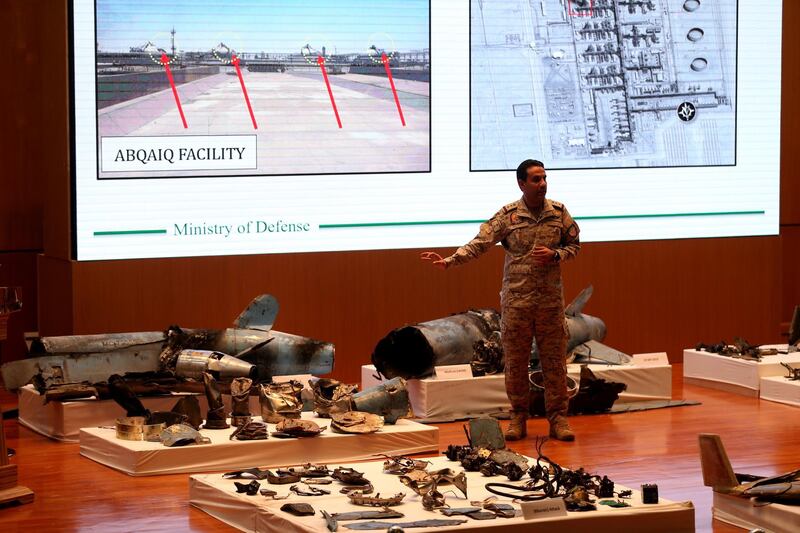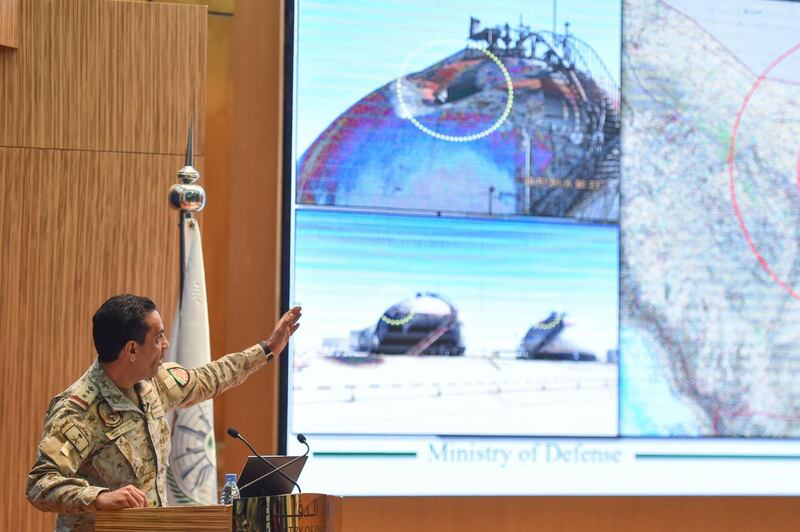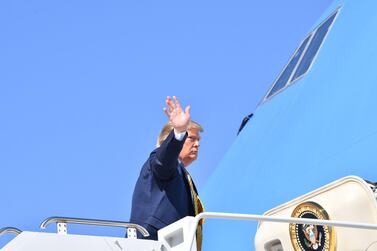Saudi Arabia on Wednesday laid out the remnants of multiple rockets and drones it says were used in the attack over the weekend on the kingdom’s largest oil processing facility and blamed Tehran but stopped short of saying that the attack was directly carried out from Iran.
The kingdom’s defence ministry spokesman Col Turki Al Malki briefed the press on the latest of investigations into the weekend attack that knocked out nearly 50 per cent of the country’s oil processing capacity.
The press briefing came just moments after the country’s Deputy Defence Minister, Prince Khalid bin Salman, tweeted a statement thanking the Trump administration for its support in confronting the Iranian regime’s “aggression”. Saudi Arabia, he said, “stands with the USA against the forces of evil and senseless aggression,"
President Trump’s Administration has confronted the Iranian regime's and terrorist organizations aggression in an unprecedented way - we in KSA thank the President for his stance, we will continue to stand with the USA against the forces of evil and senseless aggression.
— Khalid bin Salman خالد بن سلمان (@kbsalsaud) September 18, 2019
Col Al Malki said the debris on display at the press conference showed clear evidence of Iranian aggression but he declined to directly blame the regime.
He said they are assessing where the attack originated and when they have done so they will assess the situation.
“We are working and whoever will be responsible will be held accountable,” he said. He declined to comment on whether that would include a military response.
“We confirm the country’s ability to defend itself, the attack was not an attack on Saudi Arabia but on the global economy,” he said. “Iran’s continued aggression and continued support for militia’s groups create harms on us all, …We call the international community to hold Iran responsible; all its actions show and portray its aggression."
He said that the attack was a mix of cruise missiles, manufactured in Iran in 2019, and delta wing drones that also belonged to the Iranian military.
#Saudi MOD lay out Cruise Missile and drone parts they say from attack Saturday - identified in foreground #Iranian Delta Wing UAV from #Abqaiq attack pic.twitter.com/NfTbU7SriG
— Nic Robertson (@NicRobertsonCNN) September 18, 2019
He said that the precision of the attack was beyond the capability of Tehran’s regional proxy forces and that the orientation of the impacts showed that they could not have come from Yemen, despite a claim by Iranian-backed Houthi rebels that they carried out the strikes.
"The cruise missiles used were of advanced capability, we have the date of the manufacture which is of 2019 – Iran's IRGC has this type of weaponry – all the evidence that we have gathered from the site proves that Iran's weaponry was used in the attack," he said.
In response to the statement, a Houthi military representative said the group will present evidence proving their involvement in the attack.
"We will unveil new drones used in Aramco attacks from three locations in Yemen," the spokesman said.
US Secretary of State Mike Pompeo called the attacks an "act of war" after he arrived on Wednesday night in the Red Sea city of Jeddah, where he was scheduled to meet with Saudi Crown Prince Mohammed bin Salman.
Mr Pompeo will later travel to the United Arab Emirates on Thursday to meet with Crown Prince of Abu Dhabi and Deputy Supreme Commander of the Armed Forces Sheikh Mohamed bin Zayed.
Col Al Maliki pushed back against a question about the capability of the Saudi air defence forces for failing to intercept the projectiles, saying that the kingdom has downed 252 ballistic missiles and hundreds of drones in recent months.
"No country has been attacked with so many ballistic missiles," he said. "We are proud of our air defence, we have interpenetrated hundreds of missiles, we have saved our nation and our country," he said.
On the question of the origin of the attack, Col Al Malki ruled out Yemen as he said the type of cruise missile could not have reached the more than 1,200 kilometres from the Houthi controlled region. He said that the more likely scenario is that the attacks originated in Iraq or Iran.
“The cruise missile could not reach the oil facilities and therefore could not come from Yemen. We are working to know the launch point.
"The three cruise missiles attacks launched from north to south could not have originated in Yemen, it does not go along with the Yemeni values, this is not the Yemeni people, they are taking orders and want to cover these the attacks by the IRGC," he said of the Iranian Revolutionary Guard.
The Iraqi president’s office has previously said that the US has ruled out the attacks originating in their territory.
However, Col Al Malki said they have sufficient evidence from the missiles and drones to try and pinpoint the origin, despite Iranian attempts to prevent the investigation discovering the launch site.
He stressed that there is no evidence the attack came from Yemen but said that Iranian weapons are being used to kill and injure Saudi civilians.
There have been numerous attacks by Houthi rebels using what is believed to be Iranian weapons on the kingdom, including rocket attacks on Abha civilian airport in the country’s south that left several wounded.
"Iran isn't just attacking the civilians but the infrastructure [of Saudi Arabia]," he said.
He said nearly 113 civilians have been killed by Iranian weapons given to their proxies.
All the results of their findings, he added, have been shared with allies.
Col Al Malki also stressed the strong relationship between the kingdom and the United States, saying they were working together to preserve regional peace and security.
The spokesman’s statement echoed the earlier comments from Prince Khalid in highlighting the relationship between Riyadh and Washington.
“We appreciate the United States' longstanding position on defending its allies and core interests in the region against unprovoked acts of aggression,” the deputy defence minister said.
We appreciate the United States' longstanding position on defending its allies and core interests in the region against unprovoked acts of aggression, as affirmed today by the President and Vice President, as well as former Presidents including Obama. pic.twitter.com/JO7QICEoEm
— Khalid bin Salman خالد بن سلمان (@kbsalsaud) September 18, 2019
The minister also shared a screenshot of the 2015 US-Gulf Cooperation Council Statement made at Camp David with President Barack Obama.
"The United States is prepared to work jointly with the GCC states to deter and confront an external threat to any GCC state’s territorial integrity that is inconsistent with the UN charter," the agreement reads.
In the event of such aggression or threat of such action, the statement continues, the United States will work with GCC partners to determine the appropriate action "including the potential use of military force for the defence of our GCCC partners."
Russia's Ministry of Foreign Affairs condemned US President Donald Trump's decision to increase sanctions on Iran in the aftermath of an attack on Saudi oil facilities, saying the move would solve nothing.
Speaking to reporters in New York, UN Secretary General António Guterres said no regional crisis was bigger than the one unfolding in the Gulf. “We have a chance to advance diplomacy for peace,” he said, referring to the imminent gathering of world leaders at the opening of the UN General Assembly next week.
“This attack is a dramatic escalation in the Gulf and we absolutely have to stop this kind of escalation. If there would be a major confrontation in the Gulf it would have major consequences,” said Mr Guterres.
